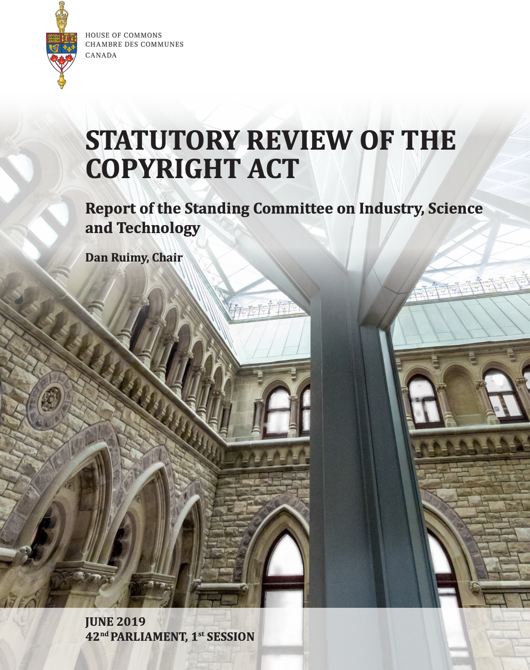Canadian Libraries Commend the Parliamentary Review of the Copyright Act Associations
From the Canadian Federation of Library Associations:
The Canadian Federation of Library Associations/Fédérations canadienne des associations de bibliothèques (CFLA-FCAB) commends the Standing Committee on Industry, Science and Technology (INDU) for its thorough report. The Committee’s Statutory Review of the Copyright Act demonstrated its consideration of a wide array of views from stakeholders, produced an in-depth exploration and nuanced analysis of testimony and concurrent developments, and delivered numerous, balanced recommendations to address the concerns expressed.
“CFLA-FCAB welcomes the recommendations in the INDU report, especially those expanding access for Canadians and the recognition and respect for Indigenous Knowledge,” said CFLA-FCAB Chair Alix-Rae Stefanko.
The INDU report addresses many of the priorities and concerns of libraries and archives in the 36 recommendations presented in the review. CFLA-FCAB advocated for many of them and finds much to commend from the report:
With regards to fair dealing, CFLA-FCAB appreciates the following:
- The recommendation to make the list of fair dealing purposes illustrative rather than exhaustive (Rec. 18).
- The recognition there is insufficient evidence linking the decline in publishers’ revenue to the addition of education for fair dealing.
- The recommendation to extend the timeline for the review of educational fair dealing, (Rec. 17); however, CFLA-FCAB believes it will take more than three years to obtain new and authoritative information and to observe the effects of new legal developments.
About Indigenous Knowledge, CFLA-FCAB:
- Applauds the emphasis on Indigenous Knowledge and the requirement for recognition and protection in Canadian law, both within the Copyright Act and beyond (Rec. 5).
- Is concerned that Rec. 5 introduces new terms (“traditional arts and cultural expressions”) rather than the terms Traditional Knowledge (TK) and Traditional Cultural Expressions (TCE) that are defined and understood in the global context.
- Recommends a firm commitment to timelines and adequate resources for the recommended consultation with Indigenous groups, experts and stakeholders.
- CFLA-FCAB would have preferred the recommendation to first recognize and affirm Indigenous ownership over their own knowledge, and subsequently recommend consultation, including support for the development and implementation of protocols to share and protect Indigenous Knowledge.
CFLA-FCAB welcomes the Committee’s findings on many important issues. Of special note are the following:
- The finding that circumventing technological protection measures for non-infringing purposes should be allowed, and that modernizing the Act in relation to digital technology is necessary (Rec. 19).
- The call for an exception that would counteract terms of use that prevent licensees from taking advantage of statutory exceptions; however, CFLA-FCAB would have preferred to see a clear recommendation for this change (p.71).
- The recommendation to reconsider Crown Copyright and adopt open licences for works prepared and published by the Canadian government (Rec. 11). CFLA-FCAB is encouraged by the potential of broadly assigning an open licence to government works that are subject to copyright controls, and we note this should preferably be CC0 or CC BY. The Committee also commented on issues related to perpetual copyright for unpublished Crown works and stated that, “Exercising copyright over governmental publications created in the public interest should be the exception rather than the rule” (p.45). CFLA-FCAB looks forward to working with Parliament to propose approaches to resolving such points.
- The facilitation of text and data mining for research and analysis (Rec. 23).
- The proposal that should the copyright term be extended from 50 to 70 years after the death of the author of a work, the extended protection should be subject to formalities (p.35-36).
- The recognition of the importance of equity of access for persons with perceptual disabilities, and of the need to track the availability of accessible formats to measure progress in this area.
CFLA-FCAB is heartened that the INDU Committee took little note of the Shifting Paradigms document, submitted by the House of Commons’ Standing Committee on Canadian Heritage. Instead of fulfilling the mandate set out by the INDU Committee to consider remuneration models for artists and creative industries, CFLA-FCAB observes that the Heritage Committee presented only three recommendations (1, 14, 22) that dealt with the remuneration issue at all.
CFLA-FCAB found the Statutory Review to be a thoughtful response to a challenging and complex set of issues. CFLA-FCAB is poised to engage in the discussions leading up to the implementation of many of the recommendations presented in the Statutory Review of the Copyright Act.
See Also: Statutory Review Of The Copyright Act (Report of the Standing Committee onIndustry, Science and Technology)
182 pages; PDF.
Filed under: Archives and Special Collections, Associations and Organizations, Data Files, Libraries, News
About Gary Price
Gary Price (gprice@gmail.com) is a librarian, writer, consultant, and frequent conference speaker based in the Washington D.C. metro area. He earned his MLIS degree from Wayne State University in Detroit. Price has won several awards including the SLA Innovations in Technology Award and Alumnus of the Year from the Wayne St. University Library and Information Science Program. From 2006-2009 he was Director of Online Information Services at Ask.com.



